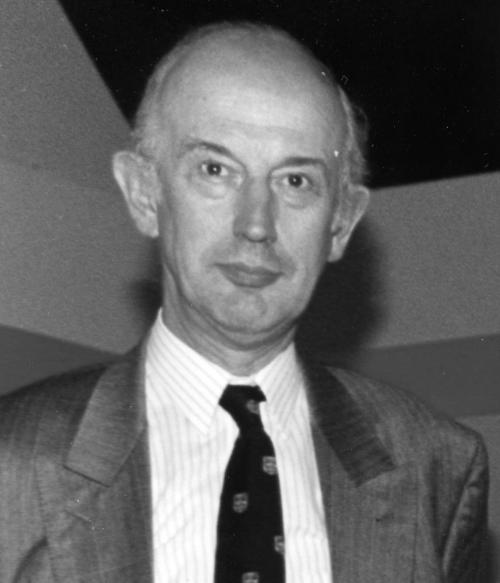Alasdair Breckenridge was born and brought up in Scotland. He received his secondary education in Cupar, Fife before proceeding to study medicine at the University of St Andrew's in 1954. He had a distinguished undergraduate record and qualified in 1961 as the best medical graduate of the year. He did his preregistration house jobs in Dundee but left Scotland in 1962 to work in London and was never to work again in Scotland although he remained (and still remains) spiritually a Scotsman.
His early specialist training was undertaken at the Royal Postgraduate Medical School (RPGMS) in London and it was at this institution that he trained in Clinical Pharmacology after he passed his MRCP examination in 1964. He worked at the RPGMS as a consultant physician and Lecturer/Senior Lecturer from 1969 to 1974 when he moved to Liverpool to take up the new chair of Clinical Pharmacology at the University of Liverpool. His research interests while at the RPGMS were mainly in the cardiovascular field. He published extensively on hypertension and was one of the first scientists to link insulin resistance with cardiovascular disease. He also did extensive work on the anticoagulant warfarin and it was through this work that he developed an interest in drug metabolism and drug interactions, which were to stay with him for the rest of his career. This work brought him the Paul Martini prize in Clinical Pharmacology in 1974 and the Goulstonian lecturership at the Royal College of Physicians in 1975.
On moving to Liverpool, Alasdair was very conscious that most clinical pharmacologists in the UK were working in the general field of cardiovascular disease and he saw the move to Liverpool as an opportunity to expand the research horizons of the discipline of clinical pharmacology. In this endeavour, he was most successful and gathered around him a number of clinical and basic scientists to produce a genuinely unified department of pharmacology and clinical pharmacology. The first area of endeavour was the work with oral contraceptive steroids, which produced a large number of important publications concerning their kinetics, metabolism, dynamics and drug interactions over the next 15 years or so.
One of the major attractions of a move to Liverpool was the School of Tropical Medicine in that city and the clinical pharmacology of drugs used in the treatment of tropical diseases was a totally unexplored area in 1974. Under his direction the Department of Pharmacology and General Therapeutics (to give it its formal title at this time) developed close links with the School of Tropical Medicine and with units in the field in such countries as Thailand, Ghana, Kenya and Malawi. The main disease areas that were studied were onchocerciasis and malaria and this latter disease was of particular interest to Alasdair. It was also out of an interest in tropical disease that the Department started work on the drugs used for the treatment of HIV disease and Alasdair and his team rapidly gained an international reputation in this field too.
Alasdair however, has a much wider range of interests than just clinical work (in which he undertook a regular service commitment) and the academic work of research and teaching with its associated involvement in university committees. He joined the Committee on Safety of Medicines in 1984 and became its Chairman in 1999. Even after retirement from the University he will continue to be actively involved in this field and will take on the chairmanship of the joint agency that will result in April 2003 when the Medicines Control Agency and the Medical Devices Agency are merged. He has been closely involved with the administration of the National Health Service both at unit, regional and national levels. He was closely involved with the Mersey Regional Health Authority from an early stage after his arrival in Liverpool and became Vice-Chairman in 1990. As various NHS mergers took place Alasdair moved with the mergers and became Vice-Chairman of the NW Regional Health Authority in 1994 and, with the loss of the Regional Health Authorities in 1996, he became Chairman of the NW Regional Office of the then NHS Executive.
He has been closely involved with the administration of research on a national level in a number of fields and in particular was on the Council of the MRC from 1992 to 1996 and was chairman of the Joint Medical Advisory Committee of the Higher Education Funding Council for England from 1998 to 2002. This national involvement has taken Alasdair into a number of international interests that exceed the obvious international reputation that his research endeavours have earned him. For many years he has been involved with the World Health Organization serving on number of official committees and, in addition to being Foreign Secretary of the British Pharmacological Society from 1985 to 1991, he has been closely involved with the International Union of Pharmacology (IUPHAR). He has served as a councillor for IUPHAR both on the main Council and on the Clinical Pharmacology Section and he has been closely involved with the organization of a number of International Congresses in Pharmacology and Clinical Pharmacology, including the first World Congress of Clinical Pharmacology held in London in 1980 where he was chairman of the scientific committee.
Retirement from his position as an honorary consultant physician to the National Health Service and from the University of Liverpool will not mean a lessening of the activities in Alasdair's life, more a re-organization of these. In thanking him for his many contributions we also wish him all the very best in his future endeavours.
The Editors and Editorial Board of the British Journal of Clinical Pharmacology are pleased to devote this issue of the journal to the Proceedings of the Festschrift held in honour of Professor Alasdair Muir Breckenridge at the University of Liverpool, June 2002.



